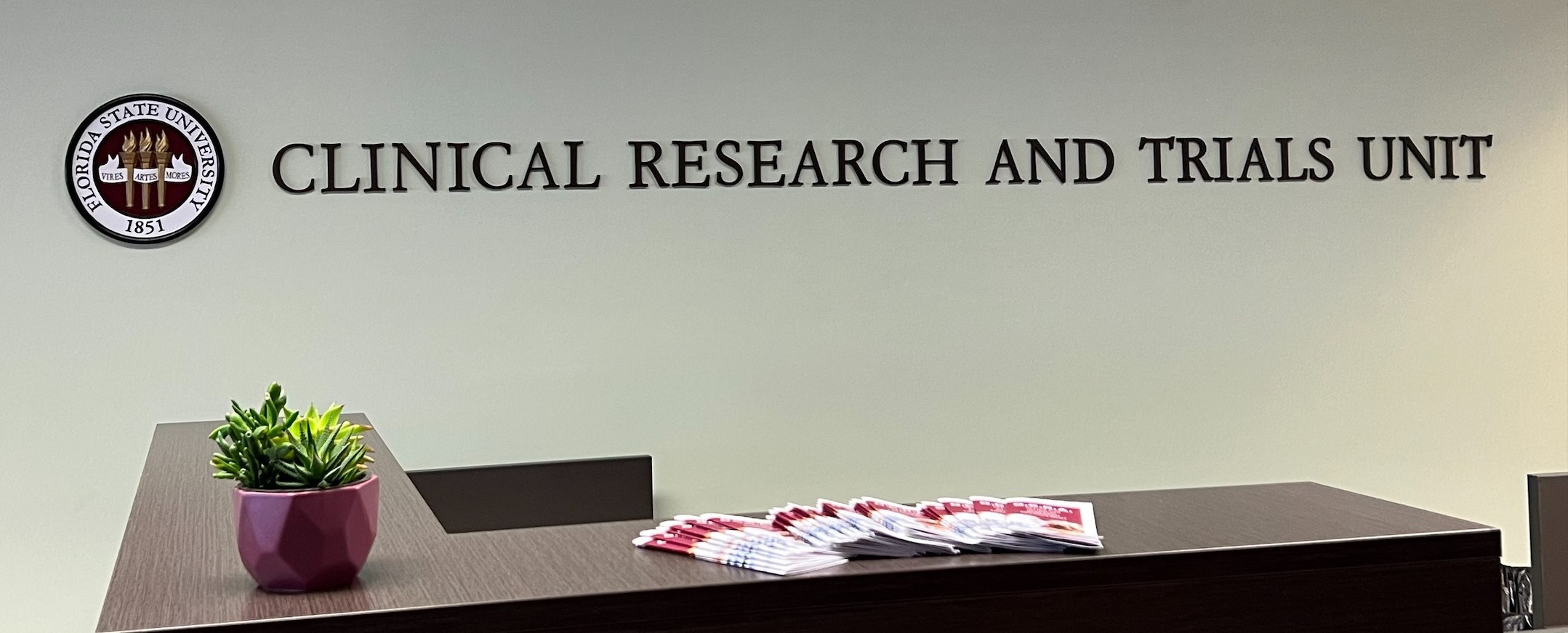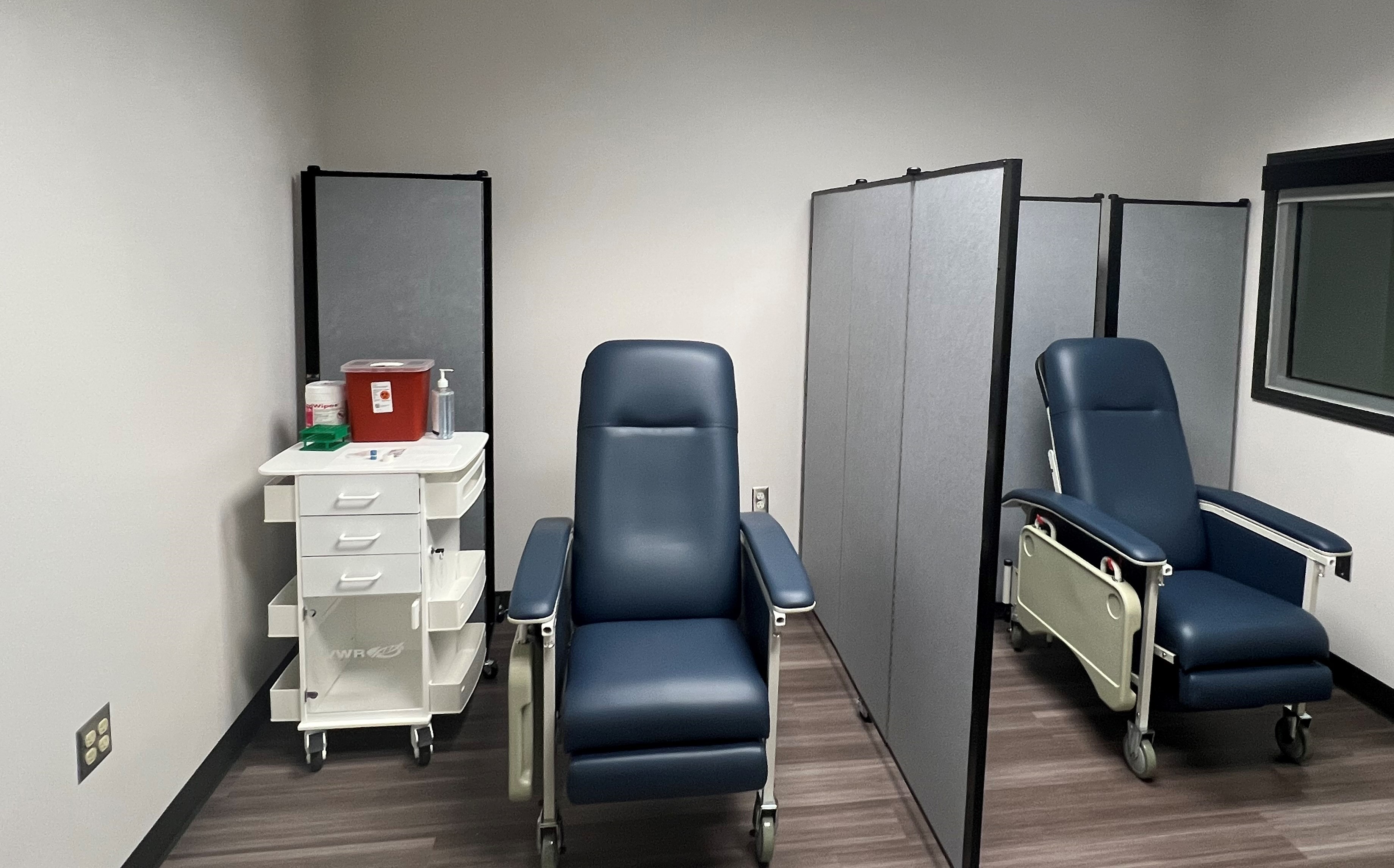
Clinical Research Facilities and Labs at FSU
BY: Nicole Viverito | PUBLISHED: December 5, 2022
We surveyed the Florida State University campus to highlight the breadth of clinical research facilities and laboratories available to scientists looking to conduct innovative, health-related research with human subjects. Our goal is to foster collaboration and interdisciplinary research, and these research teams provide inspiring examples of the clinical research possibilities at FSU. For more information, please visit each unit’s website and feel free to reach out to team leaders regarding opportunities to learn specialized methods and collaborate on new research projects.
Clinical Research and Trials Unit (CRTU)

The CRTU is a 2,200 square foot facility located at Innovation Park designed to support clinical research and clinical trials that help advance understanding, prevention, and treatment of human diseases and health conditions. The CRTU is managed by the Office for Clinical Research Advancement (OCRA) and directed by Donna O’Neal and Sharon Liebrich. The outpatient research space at the CRTU includes private exam rooms, interview/testing and consultation rooms, and vital signs/phlebotomy space with processing and specimen storage capabilities. An open area provides flexible, multi-use space that can be reconfigured to accommodate different studies. The space also includes an ADA compliant restroom and shower. The CRTU is equipped to be adaptive and supportive for a variety of clinical research needs. Staff are available to assist with study design, determination of site feasibility, participant recruitment, consenting, and administration of research assessments and procedures. OCRA also provides biostatistical services, IRB protocol consultation, assistance with ClinicalTrials.gov registration and reporting, and partnership opportunities with Tallahassee Memorial HealthCare for clinical research. Since opening in April 2022, research projects from the College of Nursing, College of Health and Human Sciences, and College of Medicine are already underway.
Institute for Sports Sciences and Medicine (ISSM)
The ISSM is a state-of-the-art research laboratory dedicated to optimizing health, body composition, and human performance. Established in 2010, the ISSM is a collaborative effort between the College of Health and Human Sciences, FSU Athletics, the College of Medicine, Nike, and Tallahassee Orthopedic Clinic. Directed by Dr. Mike Ormsbee, Professor in the Department of Nutrition and Integrative Physiology, the ISSM aims to be an international leader in sport science and sports medicine through its research, teaching, and community outreach. The space includes a biochemistry laboratory for measurement of changes in metabolic and hormonal markers in blood resulting from exercise and nutritional interventions. This is accompanied by a medical exam room for phlebotomy and microdialysis probe insertion. As far equipment, the space is outfitted with a dual-energy x-ray absorptiometry (DXA) scanner, BodPod, Biodex dynamometer, AMTI force plates, AlterG anti-gravity treadmill, Woodway treadmill, Velotron and Monark cycle ergometers, Watt Bike, Concept2 rowing ergometer, ParvoMedics metabolic cart, and a variety of different analysis tools and software to capture the dynamics of human movement and metabolism.
Current research collaborations include studies with the College of Health and Human Sciences, College of Medicine, School of Entrepreneurship, FSU Athletics, and Tallahassee Orthopedic Clinic, conducting studies in populations ranging from elite athletes to people with chronic disease. The ISSM has also recently reopened their community outreach program from 2016 to with pay-for-service testing, allowing community members to go through the “athlete experience.” Participants receive individualized data to improve their health, including their fitness level, lactate threshold, aerobic capacity, body fat, and muscle mass.
Cardiovascular and Applied Physiology (CAP) Laboratory

The Cardiovascular and Applied Physiology (CAP) Lab was established at FSU in the Fall of 2022 by Dr. Joe Watso, Assistant Professor in the Department of Nutrition and Integrative Physiology. This brand-new space in the William Johnston Building includes several technologies and measurement tools to study the mechanisms and progression of cardiovascular disease, as well as the impact of lifestyle factors (e.g., exercise, overall diet and dietary components, sleep, and medication usage) on heart health. Equipment includes a beat-to-beat blood pressure/hemodynamics monitoring system, an exercise respiratory monitoring system, a microneurography unit, ambulatory and standard blood pressure monitors, a spirometer, a respiratory belt, an ultrasound, inspiratory muscle trainers, a PowerLab 16/35 BioAmp, a grip force transducer, a recumbent cycle ergometer, and ActiGraph accelerometers. Current and upcoming studies include a clinical trial of inspiratory muscle strength training in adults with obesity, and an investigation of the influence of obesity on the cardiovascular response to controlled breathing exercises.
The Hickner Research Lab investigates how nutrition and exercise impact the regulation of blood flow and metabolism in skeletal muscle and adipose tissue, with an overall goal to improve cardiometabolic disease risk across the lifespan. Research in this lab is directed by Dr. Bob Hickner, Professor in the Department of Nutrition and Integrative Physiology. The lab has expertise in VO2max cardiorespiratory fitness testing, supervised exercise training, physical function tests, DXA and other body composition measures, flow-mediated dilation, pulse-wave velocity, near-infrared spectroscopy, indirect calorimetry, hyperinsulinemic-euglycemic clamps, stable isotope tracers, microdialysis, and blood processing and biomarker assays. Interdisciplinary research projects include collaborations with the College of Health and Human Sciences, College of Medicine, ISSM, and Department of Psychology at FSU, with additional collaborators and mentees from other research-intensive institutions.
Magnetic Resonance Imaging (MRI) Facility
FSU’s state-of-the-art MRI Facility is housed within the College of Medicine and dedicated to cutting-edge multidisciplinary research, with a goal to connect investigators in neuroscience, psychology, medicine, engineering, and other clinical research fields. Directed by Dr. Greg Hajcak, Professor in the Department of Psychology, the MRI Facility is a research-dedicated space that includes a 3T Siemens Prisma whole-body scanner (including several coil types), an MR-compatible Brain Products system for EEG and psychophysiological measures, eye tracker, and a MagPro X100 equipped with Localite TMS Navigator for brain stimulation. A stimulus presentation computer, visual projection system, and subject response system are available for scanning protocols that include behavioral or sensory tasks. The facility also includes a mock scanning environment equipped with an MRI Simulator from Psychology Software Tools, allowing researchers to familiarize participants with the procedure prior to an actual MRI session. This practice environment helps increase comfort for participants, translating to reduced motion and higher quality MRI data. Current users include faculty members in Psychology, Neuroscience, Biomedical Sciences, Nursing, and the National High Magnetic Field Laboratory, with studies examining pain, mental health, reward, memory, attention, emotion, metabolism, and neurodegenerative diseases.

The FSU Neuromodulation Lab strives to help patients and participants succeed by researching non-invasive mental health technology that will help improve symptoms of dysphoria caused by depression, anxiety, PTSD, and pain. Led by Drs. Andy Kozel and Kevin Johnson in the College of Medicine, research studies primarily focus on the use of Transcranial Magnetic Stimulation (TMS) and Virtual Reality (VR) as novel therapies for dysphoria. The FSU Neuromodulation Lab is located in Innovation Park and houses the following equipment: MagVenture MagPro R30 stimulator and coils, Magstim Rapid2 Stimulator with active and sham coils (for double-blind trials), Brainsight Neuronavigation System with a specialized TMS chair (includes tools to reconstruct brain images), Compumedics Neuroscan EEG System, Valve Index RX System, and Oculus Quest 2 VR System. The lab works with Veterans with PTSD, as well as adults suffering from anxiety, depression, PTSD, and/or chronic pain. Collaborators currently include researchers in Psychology and Social Work.
Brain Science and Symptom Management Center
The Brain Science and Symptom Management Center focuses on the prevention, management, and amelioration of pain using brain stimulation as a nonpharmacological approach. Led by Drs. Hyochol “Brian” Ahn and Hongyu Miao, this Center has several ongoing projects using self-administered Transcranial Direct Current Stimulation (tCDS) for the management of pain in older adults in a home-based model of care. The Center is also located in Innovation Park and has additional capabilities in Functional Near Infrared Spectroscopy (fNIRS), Quantitative Sensory Testing (QST) for sensory nerve fiber function, Touch-Test Sensory Evaluators, an Analog Pressure Algometer, and a ThermoFisher Water Circulator for temperature-controlled fluid circulation. The Brain Science and Symptom Management Center has collaborations within the College of Nursing, College of Medicine, College of Social Work, Department of Statistics, Department of Psychology, FAMU-FSU College of Engineering, and Tallahassee Orthopedic Clinic.
L. L. Schendel Speech and Hearing Clinic
The L.L. Schendel Speech and Hearing Clinic serves the community to improve communication abilities of clients, while simultaneously providing a teaching and clinical research laboratory for students and professional. From a research perspective, the goal is to develop exemplary assessment and treatment procedures for use by professionals in speech-language pathology and audiology. The Speech and Hearing Clinic is led by Dr. Tricia Montgomery in the School of Communication Science and Disorders. Clinic capabilities include comprehensive hearing evaluations across the age spectrum, hearing aid and assistive listening devices, cochlear implants, and Auditory Verbal Therapy. In the area of speech-language disorders, the Clinic has expertise in articulation, language, learning, fluency, and voice disorders, as well as other disorders of speech, language, or cognition due to neurological damage or disease (e.g., stroke, head injury, progressive neurological disease). The Clinic also helps clients manage swallowing disorders and dysphagia. Finally, the Assistive Communication Lab specializes in meeting Augmentative and Alternative Communication (AAC) needs of people with severe communication disorders associated with a wide variety of conditions (e.g., muscular dystrophy, autism).

Translational Science Laboratory
The Translational Science Laboratory (TSL) provides the physical space, applied technologies, and PhD level staff to assist faculty with state-of-the-art analysis in proteomics, metabolomics, and genomics. TSL staff provide experimental consultation ahead of grant submissions and start up of new projects, conduct sample processing and data analysis, and assist with manuscript development. The TSL is directed by Dr. Roger Mercer in the College of Medicine and serves scientists across FSU and from other institutions. The space houses several mass spectrometers, some of which are operated by TSL staff and others that are used for training researchers. They have an Illumina NovaSeq 6000 and Covaris E220 Ultrasonicator on site for sequencing. Researchers can also operate the following equipment: Agilent OFFGEL Fractionator, TA Instruments nano-Differential Scanning Calorimeter, Agilent 1260 HPLC with Wyatt Dawn HELEOS light-scattering detector, ThermoFisher Scientific Express SC250EXP SpeedVac Concentrator System, Agilent 2100 Bioanalyzer, Thermo Scientific Qubit 2.0 benchtop fluorometer, and GE Healthcare NanoVue UV/Vis spectrophotometer. The TSL is always open to interdisciplinary research. For example, the TSL has performed chemical crosslinking mass spectrometry (XL-MS) in a study of heart failure due to abnormal regulation of myocardial force production, performs all of the sequencing for FSU’s Center for Anchored Phylogenomics with collaborators around the world, and collaborated on the TMH-FSU Rapid Response Laboratory for sequencing of the SARS-CoV-2 genome variants during 2021-2022.
Nicole Fearnbach Viverito | Research Development Coordinator for Health & Life Sciences | Office of Research Development
Dr. Nicole Fearnbach Viverito specializes in research development for the Health and Life Sciences, with an emphasis on increasing competitiveness of grant proposals to the National Institutes of Health (NIH) and other health-oriented funding agencies. She also coordinates the Mock Review Panel Program.
Prior to joining the Office of Research Development, Nicole was an Assistant Professor in the Clinical Sciences Division at Pennington Biomedical Research Center, after completing a T32 postdoctoral fellowship. She was a USDA NIFA predoctoral fellow during her PhD in Nutritional Sciences at Penn State. She received her bachelor's degree in Exercise Science from Florida State. During that time, Nicole was a member of the Flying High Circus and now serves as the President of the FSU Circus Alumni Association.




